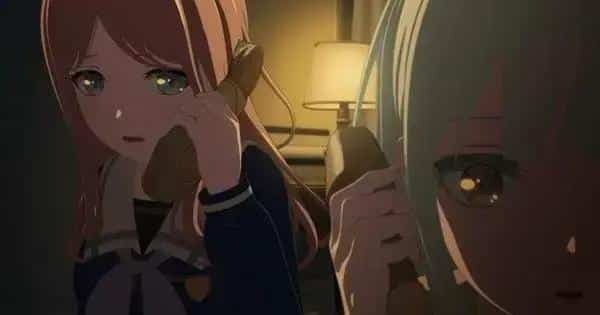In the intense anime _Ave Mujica – The Die is Cast -_, episode 6 takes a hard look at emotional trauma and redemption. As the characters navigate their past pains, we witness a powerful exploration of growth and healing. This episode not only highlights Soyo’s newfound empathy but also delves into the intertwined lives of Mutsumi and Mortis, showcasing the complexities of friendship and self-acceptance. With breathtaking visuals and gripping storytelling, this installment is a turning point for the series, navigating the delicate balance between darkness and hope.
Introduction to Ave Mujica Episode 6
Have you ever felt like your past was holding you back? In Ave Mujica Episode 6, the characters face their deepest fears and struggles, showing us that healing is possible, even in the darkest times. This episode isn’t just about drama—it’s about connection, growth, and the power of empathy.
Meet Soyo, a character who steps into the role of a therapist, guiding others through their pain. Her journey is raw and real, reminding us that even the strongest people need help sometimes. Then there’s Mutsumi, whose emotional scars run deep. Her story is a rollercoaster of highs and lows, but it’s one you won’t want to miss.
And let’s not forget Mortis and Mutsumi’s complicated relationship. It’s messy, it’s heartbreaking, but it’s also full of hope. The way their bond evolves will leave you reflecting on your own connections.
With stunning visuals and a storyline that keeps you hooked, this episode is a masterpiece. It’s not just entertainment—it’s a lesson in resilience and the beauty of second chances.
Soyo’s Role as a Therapist
Have you ever met someone who just *gets* you? In Ave Mujica Episode 6, Soyo becomes that person for the other characters. She’s not a licensed therapist, but her ability to listen, understand, and guide others through their pain is nothing short of inspiring.
Imagine carrying the weight of your past, feeling like no one could possibly understand. That’s where Soyo steps in. She doesn’t just offer advice—she creates a safe space for others to open up. Her approach is gentle yet firm, reminding us that healing isn’t about fixing everything at once. It’s about taking small, meaningful steps forward.
What makes Soyo’s role so special is her own vulnerability. She’s not perfect, and she doesn’t pretend to be. Her struggles make her relatable, and her growth throughout the episode shows that even the strongest people need support sometimes.
If you’ve ever felt lost or alone, Soyo’s story will resonate with you. It’s a reminder that empathy can be a powerful tool for healing, both for ourselves and for others.
The Emotional Journey of Mutsumi
What does it mean to truly heal? In Ave Mujica Episode 6, Mutsumi’s story takes us on an emotional rollercoaster that feels all too real. Her journey isn’t just about overcoming pain—it’s about finding the courage to face it head-on.
Mutsumi carries scars that run deep, both emotionally and mentally. She’s been hurt, betrayed, and left to pick up the pieces on her own. But what makes her story so compelling is her resilience. Even when it feels like the world is against her, she keeps going. It’s messy, it’s raw, and it’s incredibly human.
One of the most touching moments in the episode is when Mutsumi begins to open up. It’s not easy for her—she’s spent so long hiding her pain. But with the help of Soyo and others, she starts to see that she’s not alone. That moment of connection is powerful, reminding us that healing often begins with vulnerability.
If you’ve ever felt like your struggles define you, Mutsumi’s journey will hit close to home. It’s a story of pain, yes, but also of hope, growth, and the strength to keep moving forward.
Mortis and Mutsumi’s Complex Relationship
Have you ever had a relationship that felt like a puzzle? In Ave Mujica Episode 6, Mortis and Mutsumi’s bond is exactly that—complex, messy, and deeply human. Their story isn’t about perfect friendships or fairy-tale endings. It’s about real emotions, real struggles, and the beauty of finding connection in unexpected places.
Mortis and Mutsumi’s relationship is built on layers of pain and misunderstanding. They’ve hurt each other, intentionally or not, and those wounds don’t heal overnight. But what makes their dynamic so compelling is the way they try. Even when it’s hard, even when it hurts, they keep reaching out to each other.
One of the most powerful moments in the episode is when Mortis and Mutsumi finally have an honest conversation. It’s not easy—there’s anger, tears, and a lot of unspoken words. But in that moment, you can see the cracks in their relationship start to mend. It’s a reminder that even the most broken bonds can be repaired with time, effort, and a little bit of vulnerability.
If you’ve ever struggled with a complicated relationship, Mortis and Mutsumi’s story will feel familiar. It’s a testament to the power of forgiveness, growth, and the courage to keep trying.
The Dark Ironies of Soyo’s Apology
Have you ever said sorry and realized it wasn’t enough? In Ave Mujica Episode 6, Soyo’s apology is layered with irony and emotion, making it one of the most thought-provoking moments in the series. Her words aren’t just about saying sorry—they’re about confronting the weight of guilt and the complexity of forgiveness.
Soyo’s apology comes at a pivotal moment, but it’s not the straightforward act of remorse you might expect. Instead, it’s filled with contradictions. She’s trying to make amends, but her words reveal how much she’s still struggling with her own feelings. It’s a moment that feels raw and real, reminding us that apologies aren’t always clean or easy.
What makes this scene so powerful is the way it challenges our expectations. Soyo isn’t just apologizing to others—she’s also grappling with her own guilt. Her words are a mirror, reflecting the messy, complicated nature of human emotions. It’s a reminder that sometimes, saying sorry is just the beginning of a much longer journey toward healing.
If you’ve ever struggled with guilt or forgiveness, Soyo’s apology will hit close to home. It’s a moment that stays with you, long after the episode ends.
Visual and Directorial Highlights
Have you ever watched something so beautiful it took your breath away? That’s exactly what Ave Mujica Episode 6 delivers. The visuals and direction in this episode aren’t just good—they’re unforgettable. Every frame feels like a painting, and every scene pulls you deeper into the story.
Let’s start with the colors. The palette shifts to reflect the characters’ emotions, from dark, moody tones during moments of pain to soft, warm hues when hope begins to shine through. It’s a subtle but powerful way to connect you to the characters’ inner worlds.
Then there’s the cinematography. The camera angles and movements are so intentional, drawing your attention to the smallest details—a trembling hand, a tear-streaked face, or a quiet glance. These moments feel intimate, like you’re right there with the characters, sharing their struggles and triumphs.
And let’s not forget the pacing. The way the story unfolds keeps you hooked, balancing intense emotional scenes with quieter, reflective moments. It’s a masterclass in storytelling, proving that great direction isn’t just about what you see—it’s about how you feel.
If you’re a fan of anime that’s as visually stunning as it is emotionally gripping, this episode is a must-watch. It’s a reminder of how powerful art can be when every detail is crafted with care.
Conclusion: A Meticulously Orchestrated Train Wreck
Have you ever watched something so chaotic, yet so beautiful, that it left you speechless? That’s exactly how Ave Mujica Episode 6 concludes. It’s a train wreck—but not the kind you’d look away from. Instead, it’s a meticulously orchestrated collision of emotions, where every moment feels intentional and every detail matters.
As the episode wraps up, you’re left with a mix of feelings. There’s pain, yes, but also hope. The characters’ struggles don’t magically disappear, but you can see the glimmers of growth and healing. It’s messy, it’s raw, and it’s incredibly real.
What makes this conclusion so powerful is how it ties everything together. The emotional highs and lows, the visual artistry, the complex relationships—it all comes full circle. You’re left reflecting on the characters’ journeys and, in some ways, your own.
If you’ve ever felt like life is a series of ups and downs, this episode will resonate with you. It’s a reminder that even in the midst of chaos, there’s beauty to be found. And sometimes, the most meaningful stories are the ones that don’t tie up neatly with a bow.







